As we are speaking of the North, what about Markland in the north: did they colonise a lot already? It will be interesting to see how borders with Markland will look like and how this will affect future relations between both nations.
The Third Odyssey - An Elysian Tale
- Thread starter Crimson Lionheart
- Start date
-
We have updated our Community Code of Conduct. Please read through the new rules for the forum that are an integral part of Paradox Interactive’s User Agreement.
You are using an out of date browser. It may not display this or other websites correctly.
You should upgrade or use an alternative browser.
You should upgrade or use an alternative browser.
Threadmarks
View all 100 threadmarks
Reader mode
Reader mode
Recent threadmarks
Chapter 75: A Whole New World (1766-1775) Chapter 75.5: In Memoriam/Zimon I Chapter 76: Seize the Day (1775-1776) Chapter 77: The Dark Coast (1776-1785) Chapter 78: The Elysian Revolution (1785-1789) Chapter 78.5: In Memoriam/Maria I Chapter 79: Epilogue/Republican Ending (1789-1821) Chapter 79: Epilogue/Imperial Ending (1789-1821)
Chapter 9.5: In Memoriam/John I
John I Palaiologos
Lived May 5th 1446 - June 13th 1494
Emperor of Elysia: 1472 - 1494

Lived May 5th 1446 - June 13th 1494
Emperor of Elysia: 1472 - 1494
While not living up to the tremendous legacy that his father had achieved, John I’s rule was perhaps the most important during the early history of Elysia. It was during his rule that the Elysians prioritised looking inward rather than outward, and as a result, the nation was strengthened considerably. In another aspect of his rule, John’s indirect methods of expansion allowed Elysian culture to flourish, and with a focus on administration, the Empire became a regional superpower.
John was born in the Imperial Palace to Emperor Constantine I and Empress Zoe Acominata, the eldest of three children. At the age of 4, John started to display fascinating signs of extraordinarily high mental capacities, leading his family and many within the court to believe that John was a genius, and as a result received excellent tutoring from private teachers. But growing up, John had difficulty establishing and maintaining social relationships with some people, as well as marked difficulties in behavior, social interaction, communication and sensory sensitivities. Centuries after his rule, modern research characterized John I would have been on the Autism spectrum.
During the Palaeologan Renaissance that characterised his father's reign, John always surrounded himself with books that were taken during the Odyssey, fascinated by the aspect of knowledge in all forms. As the heir to his father, John focused his energy into working the bureaucratic and administrative aspects of Elysia. Curiously, John highly disliked warfare and was seen by many of the dynatoi as a pacifist who objected against the use of violence directly, but ordered military campaigns with the assistance of the military council as expansion was still necessary.
With the death of his father in 1472, John ascended to the throne and immediately had a newfound enthusiasm to went straight to work in reforming the administration of the realm. Multiple diplomatic and administrative events occurred under his rule, such as re-establishing contact with the shipwrecked survivors of Lanthanopolis in 1476 and the Council of Platos that established Elysian Orthodoxy in 1482 as a separate branch of Christianity, and the establishment of the Varangian Order to the far north. Major expansion occurred within the borders of the Empire, largely within the southern realms of the Empire where entire barbaroi realms were conquered and absorbed efficiently.
John I would also become the major patron of the new Elysian identity and helped assist the Senate in organizing the Elysification process of newly integrated territory. As a cultural supporter, John was the most powerful and enthusiastic patron of the arts in Elysia and sponsored promising Elysian artists. In establishing the relationship with the Iroquois during the late half of his rule, considered a grand diplomatic victory in early Elysian history, John’s brilliant administrative abilities were well praised across the government. During this time, the first thanksgiving would take place in 1492 with the Great Chief Soonongjoowau, where it would become a national holiday many decades after the event had taken place.
The greatest achievement that Elysia had accomplished during John’s reign was the highly ambitious Appalachian Pathways, a highway project first visuralied by Emperor Constantine and the senate many decades prior. Completed in 1487 after eleven years of hardwork, the pathways allowed settlers and merchants easy access through the mountains and into the lands beyond Elysia. The Appalachian Pathways would be compared to Ancient Roman roads, importantly, the Appian Way.The pathway construction was so reliable, that no major upgrades to the existing system would be needed until the 20th century, highlighting the marvels of Elysian engineering.
Leading Elysia to become considerably stronger during his reign, John I would lead Elysia during another strong reign. On June 13th 1494, Emperor John I would pass away from pneumonia. Interestingly, the Emperor had remained celibate for his entire life and dedicated his entire life towards making Elysia into a better place, allowing future succession to pass seamlessly to his brother Manuel and his descendents
A posthumous painting of John I, painted in the mid 16th century
John I’s legacy had left a large effect onto Elysian culture, society and onto the Empire as a whole. Transforming the regional power into a superpower, John’s abilities to govern helped strengthen the foundations of the Elysian Empire. John would be buried in the Cathedral of Saint Nicholas, one of Nea Konstantinopolis’s largest churches.
Chapter 10: A New Direction (1495-1500)
Chapter 10: A New Direction (1495-1500)
With the ascension of Manuel, the strong foundations of the Empire were about to be tested. Although a capable man in his own right, Manuel was far different than his older brother John. As the last of the sons of Constantine, Manuel was a traditionalist and valued the strong foundations that made up the Elysian state, and sought to use his rule mainly to help Elysian dominance on the continent.

To the Great Lakes, now known as the Borealian Lakes, the recently reorganised and powerful Iroquois had largely converted to Elysian Orthodox with great enthusiasm and zeal in an incredibly short time. After the war against the Huron, known to many as the Borealian War, the natives created a patriarchate located in a recent founding of a new city known as Tkaronto. Emperor Manuel confirmed the legitimacy of the patriarchate the first Borealian Patriarch was confirm by the Eccumenial Patriarch.
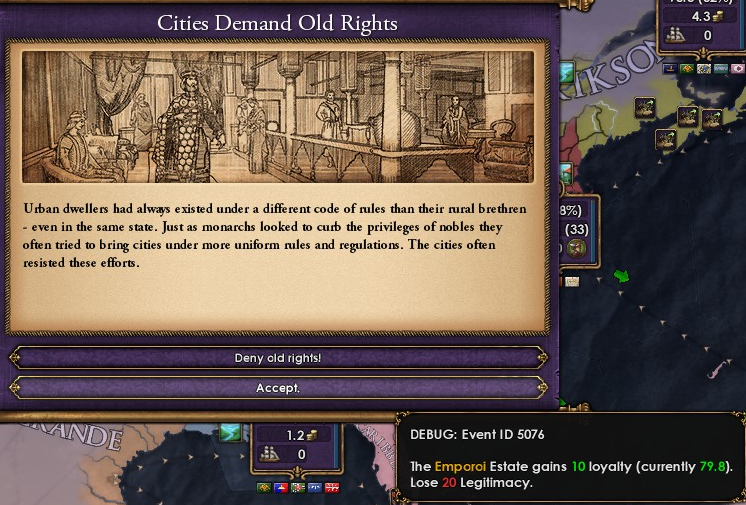
In the cities however, things were greatly different. Those living within the cities lived under a different code of rules then those living in rural areas. Just as the monarchy usually tried to curb the privileges of the nobility, the cities often resisted similar efforts. The urban populace of the population demanded their old rights, and Manuel I accepted this one time out of leniency, warning them that he will not be so forgiving next time should they demand again.
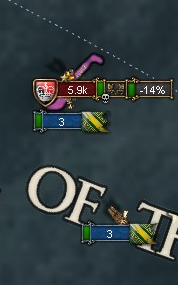
Among the nobility of Lanthanopolis, chaos had suddenly overwhelmed the city. One of Creta Minor’s generals, Aineias Romanos, had gathered support against the monarchy for what he had perceived didn’t have the best interests for the common man. Nearly 6000 armed followers of Aineias suddenly gathered their arms and quickly overwhelmed the small garrison in Lanthanopolis before suddenly capturing the small palace along with the royal family. Holding the island and the ruling family there hostage, Aineias sent a list of demands back to Nea Konstantinopolis. Either give independence to Lanthanopolis and the remainder of Creta Minor, including financial compensation, otherwise the ruling family would risk execution.
The news of the upstart rebellion against Elysian authority deeply angered the Emperor. Within its history, Elysia had never experienced a serious rebellion on its own. Emperor Manuel decided to show the Empire what would happen to traitors, with a group of highly trained, battle hardened soldiers under the command of an experienced general, being sent to deal with the insurrection.

Upon making landing on Lanthanopolis, both the armies met in battle but the core of the rebel forces was killed in the enduring battle. Alexandros Choumnos, under orders from the Emperor, ordered that as many leaders as possible be taken alive, while the remainder of the rebellion was to be crushed. Once the battle had taken place, after two days of fighting, the rebellion was crushed and rebel soldiers were cut down where they stood. Aineias and other rebel leaders were caught trying to flee, but were caught and led back into the capital. The insurrectionist army fled across the island into smaller groups, some without leadership, where they would become easy targets. Just over fifty had survived, largely the nobles who had supported Aineias and some captured local rulers who wished to work against Elysia.
After some time in captivity, Emperor Manuel personally arrived on Lanthanopolis to oversee the punishment of the insurrectionists. For treason against the Empire, the Emperor ordered the systematic execution of every single follower of Aineias and forced him to watch. Military commanders, local nobility who had defected to the rebellion and surviving soldiers themselves were lined into the town centre of the capital and ordered their beheading to be made a public event. The Elysian Emperor, the nobility and ruling family of Creta Minor and various commoners watched the execution of the rebellion. Aineas would be executed last, having watched as everyone close to him was killed off one by one.
Emperor Manuel used the rebellion to set an example for every other nobleman in the Empire. Rebellion against the crown and the Empire was to result in total annihilation.Manuel even openly admitted that the sentence he personally issued on the rebels was light, and could have gone even further. Once news spread of the outcome of the rebellion, any potential hostile ambitions by the crown were silenced. The news had terrified the nobility, and the Emperor knew it.
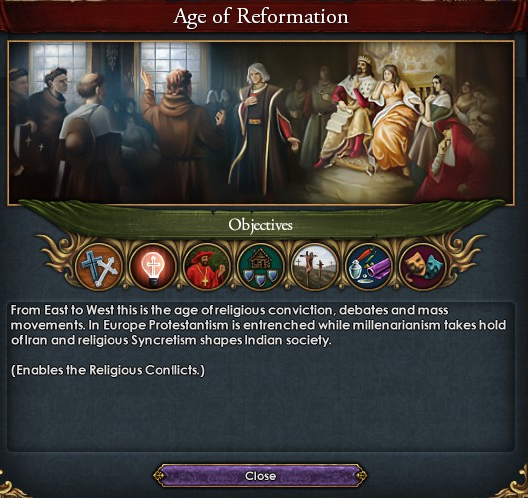
Back in the capital, the Emperor felt as if he was living within a new age. Ever since the death of his older brother, Manuel felt more at peace with himself as society started to slowly change around him. A pious man, the Emperor had always felt comfort around faith, and deeply admired the church. Growing up as a young man, he had even been friends with the previous Eccumential Patriarch and often discussed theology. While the Church felt more in place in this new world, many of its old traditions came from Europe. In part for this work, Manuel worked closely with the church to strengthen it.

The Act of Uniformity and the Blasphemy Act were both passed by the Senate on the same day as each other. The Act of Uniformity was taken with the goal of bringing a closer, more united church by enforcing church attendance and set the order of services and prayers. The Blasphemy Act enacted a common law and made it a legal offence to show contempt for or ridicule God, Jesus or the Holy Scriptures in any form or way.
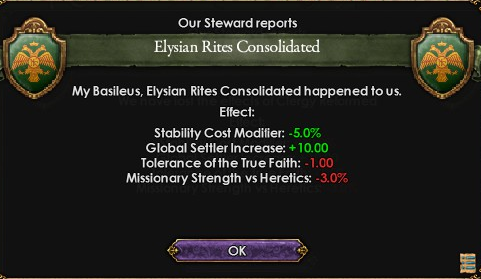
With the acts of law strengthened, the Elysian Church met with another act that had political and spiritual implications. While liturgies still played an important role in day to day worship, many of the religious rites and rituals that came from Europe had gone out of favor, while new ones had been created and were integrated into the church. Eccumential Patriarch Theodoros I and Emperor Manuel, in order to ensure continued orthodoxy and clearly define what is and is not heretical, assembled the greatest theologians of the age to create a new set of ‘Elysian Rites’. This would start one of the biggest changes of the church from European Orthodoxy, as many new rites would differ largely from traditional orthodoxy. The rites would become implemented on October 9th 1496
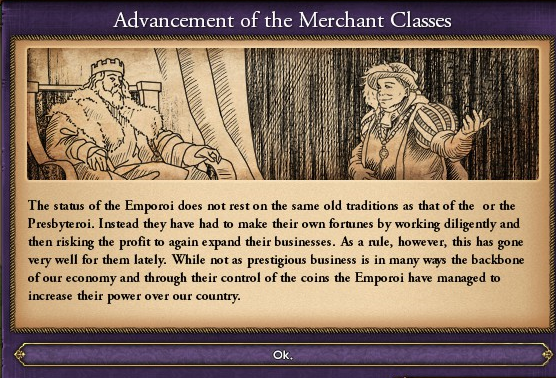
While the Emporoi did not have the same traditions as that of the church, they did not inherit the wealth that the church is associated with. Instead, the Emporoi had to make their own fortunes by working diligently and then risking their profits to again expand in their businesses and lives. Lately, this has gone very well with them. While not as prestigious as the Dynatoi or that of the Presbyteroi, they had become the backbone of the economy and through their control of the coins did their increase of power come at the expense of the Empire.
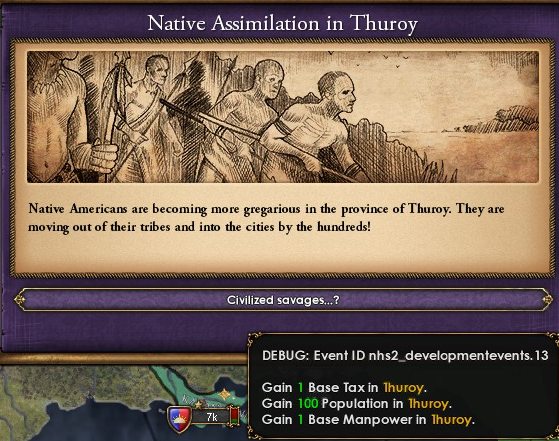
Along one of the newest provinces, the barbaroi of Thuroy started to become more fond when in the company of Elysian settlers. So much so, that hundreds started to move away from their tribes and into the new cities and towns being established.
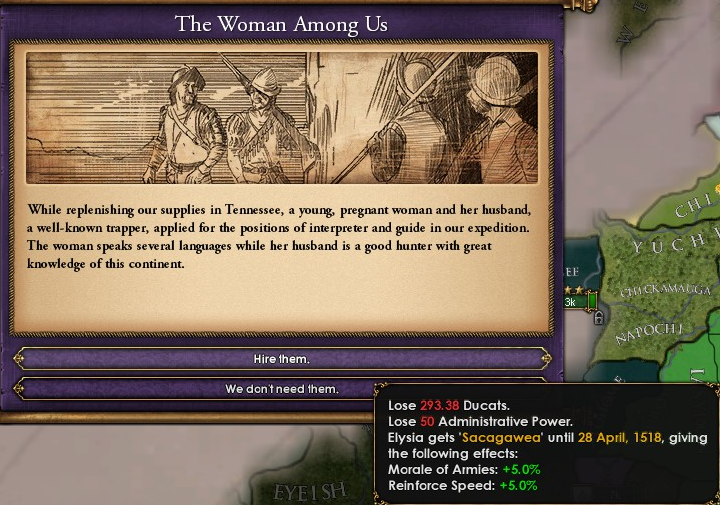
While exploring a new region and replenishing supplies, explorers discovered a young pregnant woman and her husband. Both of them had applied for positions as an interpreter and guide during the expedition. It seemed that the woman could speak several languages while her hunter was a good hunter and was knowledgeable of the continent. Immediately, both of them were hired for the exhibition.

In Thuroy, new irrigation methods are being experimented with. Elysian and Native contributions onto irrigation methods, for the most part, seem to have worked and food production is increasing in the region.
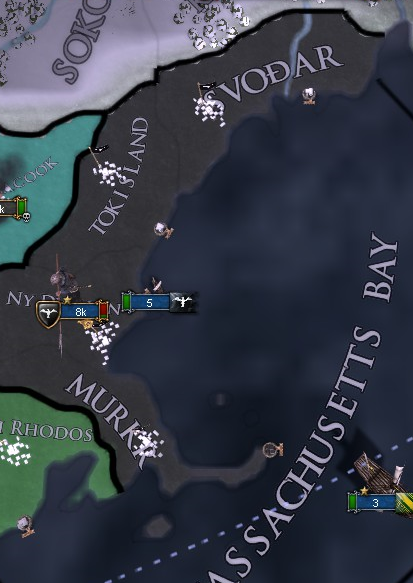
In the far north, Emperor Manuel reorganised the Varangian Guard territories. As well as receiving state-assistance with financing, the theocratic state was in a good position for its operations. With many hostile tribes still in the north, the close position was beneficial for Varangians traveling back home to Markland.
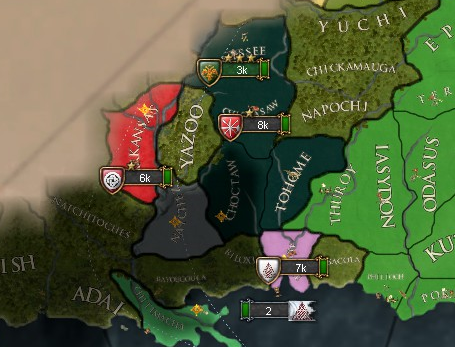
To the far south, the Imperial exhibition charted the tribes within the Mississippi. While the North was valuable in its own right, Emperor Manuel desired to secure the coastal regions for the benefit of the Empire. Tribes within the south were weaker then ones of the north, and it opened up more prospects for future expansion. It was with this policy in mind that Emperor Manuel would change the destiny of the Empire, that the Empire would avoid the large endless expanse of the interior in-favor of focusing along the coastlines and densely populated areas. 1498 and 1499 would be known as the beginning of a period known of the ‘Second Frontier’, the Elysian colonisation of the Mississippi.

As 1499 came to a close, Elysia had made gigantic leaps and bounds upon arriving in this mysterious new world only 55 years ago, becoming a regional group of exiled survivors to the most powerful entity on the entire continent. Emperor Manuel listened to the stories of his people many times as a child and chuckled at himself, imagining what the Europeans would see of what the exiled Greeks had become. The old Emperors of Rome and Elysia would be smiling upon its people. God was perhaps smiling on the fortunes of the Elysians. This was a time of destiny, and Manuel embraced the future ahead of him. This was to be the century of Elysia.
Long live the Empire
With the ascension of Manuel, the strong foundations of the Empire were about to be tested. Although a capable man in his own right, Manuel was far different than his older brother John. As the last of the sons of Constantine, Manuel was a traditionalist and valued the strong foundations that made up the Elysian state, and sought to use his rule mainly to help Elysian dominance on the continent.
To the Great Lakes, now known as the Borealian Lakes, the recently reorganised and powerful Iroquois had largely converted to Elysian Orthodox with great enthusiasm and zeal in an incredibly short time. After the war against the Huron, known to many as the Borealian War, the natives created a patriarchate located in a recent founding of a new city known as Tkaronto. Emperor Manuel confirmed the legitimacy of the patriarchate the first Borealian Patriarch was confirm by the Eccumenial Patriarch.
In the cities however, things were greatly different. Those living within the cities lived under a different code of rules then those living in rural areas. Just as the monarchy usually tried to curb the privileges of the nobility, the cities often resisted similar efforts. The urban populace of the population demanded their old rights, and Manuel I accepted this one time out of leniency, warning them that he will not be so forgiving next time should they demand again.
Among the nobility of Lanthanopolis, chaos had suddenly overwhelmed the city. One of Creta Minor’s generals, Aineias Romanos, had gathered support against the monarchy for what he had perceived didn’t have the best interests for the common man. Nearly 6000 armed followers of Aineias suddenly gathered their arms and quickly overwhelmed the small garrison in Lanthanopolis before suddenly capturing the small palace along with the royal family. Holding the island and the ruling family there hostage, Aineias sent a list of demands back to Nea Konstantinopolis. Either give independence to Lanthanopolis and the remainder of Creta Minor, including financial compensation, otherwise the ruling family would risk execution.
The news of the upstart rebellion against Elysian authority deeply angered the Emperor. Within its history, Elysia had never experienced a serious rebellion on its own. Emperor Manuel decided to show the Empire what would happen to traitors, with a group of highly trained, battle hardened soldiers under the command of an experienced general, being sent to deal with the insurrection.
Upon making landing on Lanthanopolis, both the armies met in battle but the core of the rebel forces was killed in the enduring battle. Alexandros Choumnos, under orders from the Emperor, ordered that as many leaders as possible be taken alive, while the remainder of the rebellion was to be crushed. Once the battle had taken place, after two days of fighting, the rebellion was crushed and rebel soldiers were cut down where they stood. Aineias and other rebel leaders were caught trying to flee, but were caught and led back into the capital. The insurrectionist army fled across the island into smaller groups, some without leadership, where they would become easy targets. Just over fifty had survived, largely the nobles who had supported Aineias and some captured local rulers who wished to work against Elysia.
After some time in captivity, Emperor Manuel personally arrived on Lanthanopolis to oversee the punishment of the insurrectionists. For treason against the Empire, the Emperor ordered the systematic execution of every single follower of Aineias and forced him to watch. Military commanders, local nobility who had defected to the rebellion and surviving soldiers themselves were lined into the town centre of the capital and ordered their beheading to be made a public event. The Elysian Emperor, the nobility and ruling family of Creta Minor and various commoners watched the execution of the rebellion. Aineas would be executed last, having watched as everyone close to him was killed off one by one.
Emperor Manuel used the rebellion to set an example for every other nobleman in the Empire. Rebellion against the crown and the Empire was to result in total annihilation.Manuel even openly admitted that the sentence he personally issued on the rebels was light, and could have gone even further. Once news spread of the outcome of the rebellion, any potential hostile ambitions by the crown were silenced. The news had terrified the nobility, and the Emperor knew it.
Back in the capital, the Emperor felt as if he was living within a new age. Ever since the death of his older brother, Manuel felt more at peace with himself as society started to slowly change around him. A pious man, the Emperor had always felt comfort around faith, and deeply admired the church. Growing up as a young man, he had even been friends with the previous Eccumential Patriarch and often discussed theology. While the Church felt more in place in this new world, many of its old traditions came from Europe. In part for this work, Manuel worked closely with the church to strengthen it.
The Act of Uniformity and the Blasphemy Act were both passed by the Senate on the same day as each other. The Act of Uniformity was taken with the goal of bringing a closer, more united church by enforcing church attendance and set the order of services and prayers. The Blasphemy Act enacted a common law and made it a legal offence to show contempt for or ridicule God, Jesus or the Holy Scriptures in any form or way.
With the acts of law strengthened, the Elysian Church met with another act that had political and spiritual implications. While liturgies still played an important role in day to day worship, many of the religious rites and rituals that came from Europe had gone out of favor, while new ones had been created and were integrated into the church. Eccumential Patriarch Theodoros I and Emperor Manuel, in order to ensure continued orthodoxy and clearly define what is and is not heretical, assembled the greatest theologians of the age to create a new set of ‘Elysian Rites’. This would start one of the biggest changes of the church from European Orthodoxy, as many new rites would differ largely from traditional orthodoxy. The rites would become implemented on October 9th 1496
While the Emporoi did not have the same traditions as that of the church, they did not inherit the wealth that the church is associated with. Instead, the Emporoi had to make their own fortunes by working diligently and then risking their profits to again expand in their businesses and lives. Lately, this has gone very well with them. While not as prestigious as the Dynatoi or that of the Presbyteroi, they had become the backbone of the economy and through their control of the coins did their increase of power come at the expense of the Empire.
Along one of the newest provinces, the barbaroi of Thuroy started to become more fond when in the company of Elysian settlers. So much so, that hundreds started to move away from their tribes and into the new cities and towns being established.
While exploring a new region and replenishing supplies, explorers discovered a young pregnant woman and her husband. Both of them had applied for positions as an interpreter and guide during the expedition. It seemed that the woman could speak several languages while her hunter was a good hunter and was knowledgeable of the continent. Immediately, both of them were hired for the exhibition.
In Thuroy, new irrigation methods are being experimented with. Elysian and Native contributions onto irrigation methods, for the most part, seem to have worked and food production is increasing in the region.
In the far north, Emperor Manuel reorganised the Varangian Guard territories. As well as receiving state-assistance with financing, the theocratic state was in a good position for its operations. With many hostile tribes still in the north, the close position was beneficial for Varangians traveling back home to Markland.
To the far south, the Imperial exhibition charted the tribes within the Mississippi. While the North was valuable in its own right, Emperor Manuel desired to secure the coastal regions for the benefit of the Empire. Tribes within the south were weaker then ones of the north, and it opened up more prospects for future expansion. It was with this policy in mind that Emperor Manuel would change the destiny of the Empire, that the Empire would avoid the large endless expanse of the interior in-favor of focusing along the coastlines and densely populated areas. 1498 and 1499 would be known as the beginning of a period known of the ‘Second Frontier’, the Elysian colonisation of the Mississippi.
As 1499 came to a close, Elysia had made gigantic leaps and bounds upon arriving in this mysterious new world only 55 years ago, becoming a regional group of exiled survivors to the most powerful entity on the entire continent. Emperor Manuel listened to the stories of his people many times as a child and chuckled at himself, imagining what the Europeans would see of what the exiled Greeks had become. The old Emperors of Rome and Elysia would be smiling upon its people. God was perhaps smiling on the fortunes of the Elysians. This was a time of destiny, and Manuel embraced the future ahead of him. This was to be the century of Elysia.
Long live the Empire
Last edited:
Rediscovery of Europe is inevitably coming, but they'll have nowhere to gain a foothold once you take all of the coast. They'll be fooled by the very own exiles they should've protected. A fine punishment if you ask me.
"After some time in captivity, Emperor Manuel personally arrived on Lanthanopolis to oversee the punishment of the insurrectionists."
This reads as if the Emperor had been held captive, rather than the rebels. Also, why do you have the debug mode switched on in all your screenshots?
This reads as if the Emperor had been held captive, rather than the rebels. Also, why do you have the debug mode switched on in all your screenshots?
"After some time in captivity, Emperor Manuel personally arrived on Lanthanopolis to oversee the punishment of the insurrectionists."
This reads as if the Emperor had been held captive, rather than the rebels. Also, why do you have the debug mode switched on in all your screenshots?
Both are accidents on my behalf. The first is a lack on of structure on the paragraph. The second was that I actually used debug to fix an thing or two and I completely didn't realize that I was still on. My deepest apologies if this looks unprofessional
State of the Empire: 1500
State of the Empire: 1500
The coming century was to bring about a time of great change for Elysia. With a strong nation under his rule, Emperor Manuel took the time to reflect on how far Elysia had come. If Manuel was to continue on the path of bringing prosperity and civilization to this strange new world, he needed to know the capabilities of the Empire.
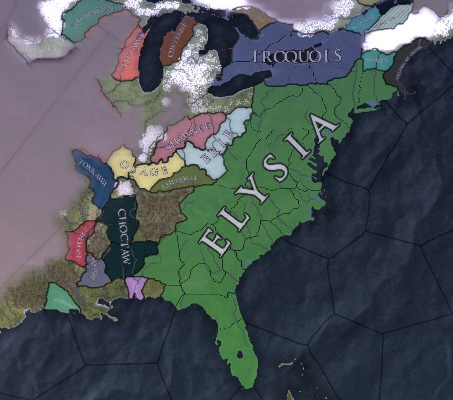
From the cold stormy weather in the far north along the New Theodosian Bay to the lush Anthiros Peninsula, the realm of Elysia has grown tremendously. With a frontier to the East towards the great Mississippi River, all expansion efforts was to be focused along the region.

Since Foundation Day, the first few years of Elysian rule was characterised by the strength of will to rule. Emperor Constantine held the entire Empire together almost completely on his own until the government could be consolidated. For many years afterwards, as the strong Imperial government was shaped and molded, the position of Emperor had largely retained its importance. Elysia also inherited the ancient Roman traditions of the senate, which slowly grew overtime as new cities were founded within the Empire. Emperor Manuel, wishing to expand on Roman traditions which helped make the ancient republic and empire great, started to strengthen the senate and hopefully reorganise it to become more beneficial for the Empire.

Originally landing with nothing but the supplies they had brought with them, the new world of Elysium proved to provide much more than what was originally needed. Once the economy started to climb, Emperor Constantine and John both worked hard to strengthen it as much as possible and let it grow. With the rapid growth of the economy that’s likely not going to stop any time soon, Elysia was thriving.
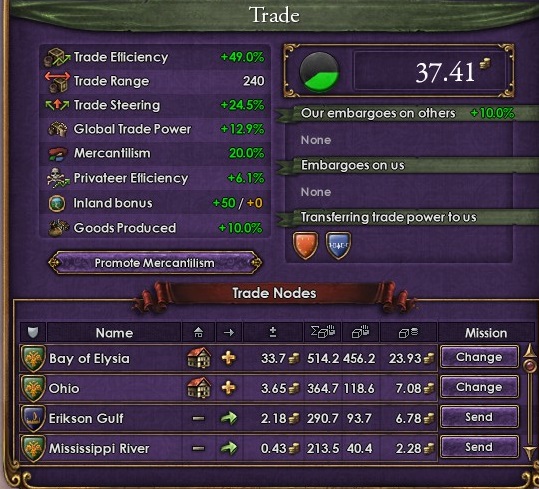
Among trade, Elysian merchants worked hard to succeed in different markets, and largely dominated in them. All trade along the Bay of Elysia was completely controlled by the Empire, and had small influence in other markets. Due to the lack of any real trade within barbaroi regions, the organised Elysians became leaders.
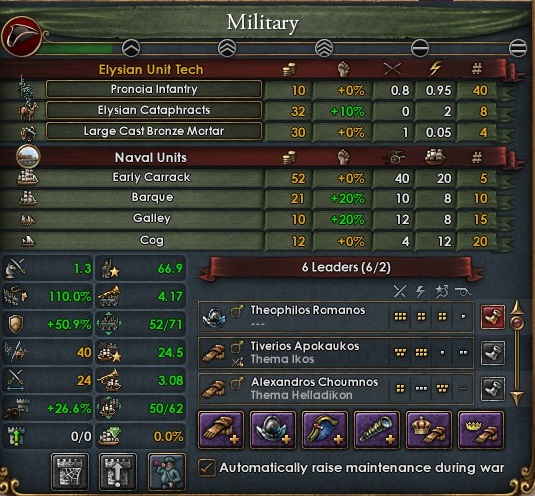
The military, seen as the pride of Elysian expansionists, remained an incredibly powerful force on the continent. Originally weak and organised like a glorified militia, later reforms among the military would transform the Elysians from their militia roots to a stable army. Native armies, originally having the upper hand against the Elysians, were now largely powerless.
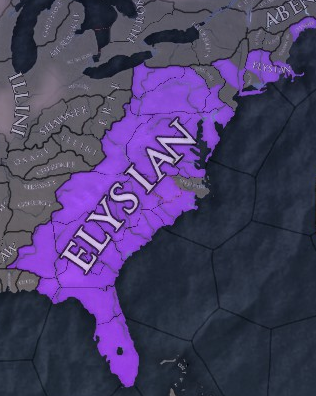
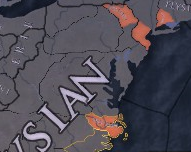
Elysification of provinces, both colonised and annexed, proved to be much more effective than the Senate had ever expected it to be. While the Elysian language was growing within popularity amongst the native populations, many spoken barbaroi languages were still spoken by converted natives. Smaller languages spoken amongst the Elysians were Norse, Ironquois and even Albanian. But the nature of the Elysian language and overwhelmingly Elysian population had kept local languages a minority, and given a generation or two, many of them would likely go extinct.
In the north, the Albanian populace of the Empire remained as culturally similar to their ancestors as much as possible. Where as the Greek language and culture began to fragment and become influenced by both local native languages and even Latin to some degree, the secluded Albanians made strict enforcement to keep their language. Due to their cold nature to not contribute to the Empire unless absolutely necessary, Emperor Manuel would need to plan ahead for integration of the Albanians into the realm, wherever they liked it or not.
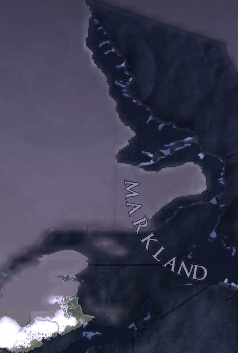
In the north, Markland had vanquished Helluland in the Great Northern War and became sole Kingdom of the North. While knowledge of the Kingdom at large remained small, Markland had experienced a long period of isolation and internal focus for a many decades. It wasn’t until that, just recently, the Norse began a campaign of conquest against barbaroi nearby the Kingdom and slowly colonising one area at a time.
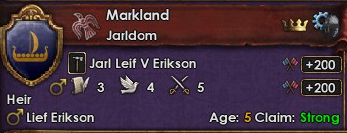
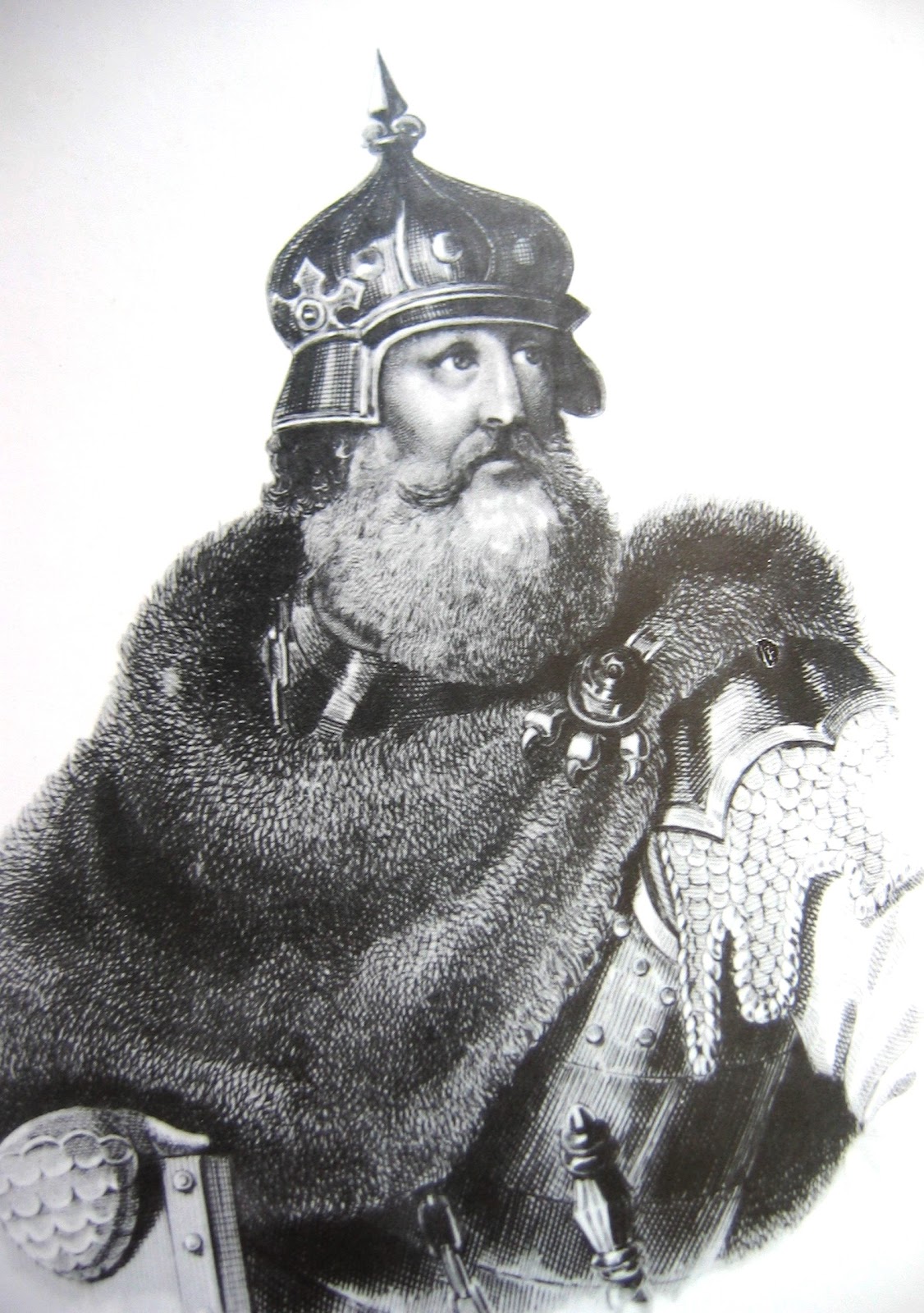
This wave of growing conquest was led by Jarl Leif V Erikson, who as a young boy, watched his grandfather meet with the newfound Elysians for the first time to discuss the trade agreement. While having a friendly demeanor as Jarl, Leif V was ruthless against his enemies and was known to have a fragile temper that, should the Jarl be angered, would send him into an uncontrollable rage. A devout follower of the Norse faith, many battles against the barbaroi would be personally led by him.

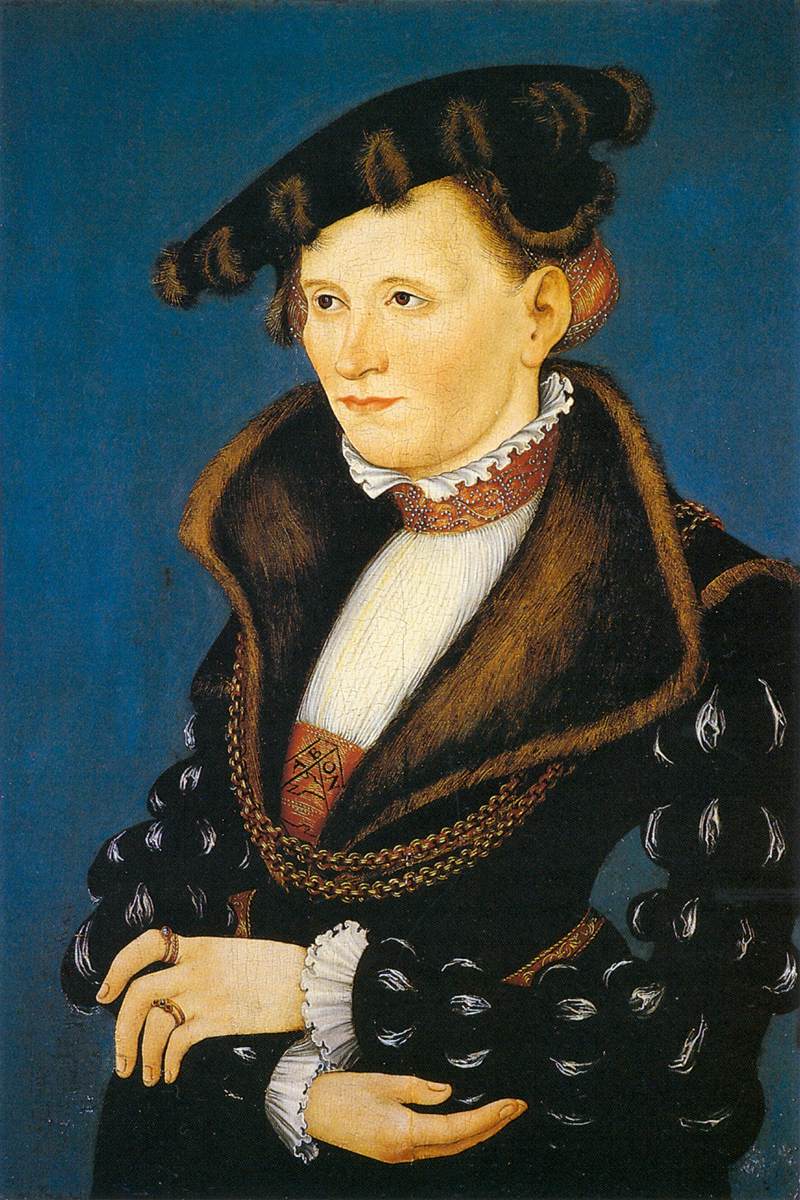
To the east was the lonesome island province of Creta Minor, led by the Megali Doukissa of Lanthanopolis, Anna I Notaras. Anna I was born under the shipwrecked survivors of the city, and under her reign, overseen its reintegration into Elysia as a semi-independent vassal state of the Empire. Known to be an adventurous woman, Anna I is also known to be a highly efficient administrator. A popular ruler, Anna I talked down the traitorous Aineas Romanos while in captivity.
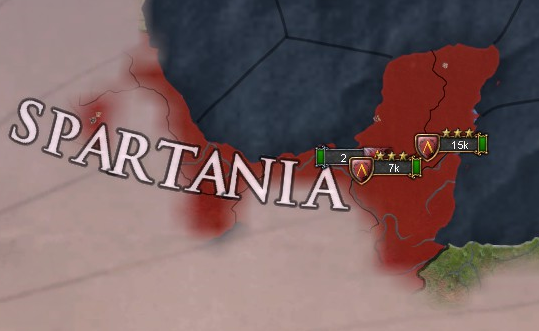
In the far south, the dream of King Leonidas came to fruition, and civilization was brought to the powerful barbaroi. With the collapse of the powerful Triple Alliance, Elite Spartanian Warriors and native allies within its borders became the sole power in the area. Having only just consolidated their gains, Spartania faces trouble as civil unrest and guerrilla war by surviving Aztec warriors. Due to the mysterious nature of the far south, it is largely unknown to Elysians on the scale of the events that had happened there.

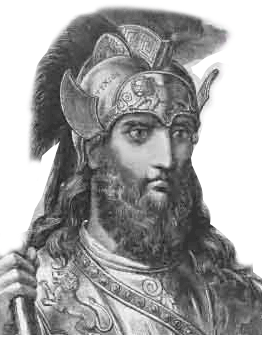
Leonidas Spartakon, originally born as Belisarius Palaiologos, quickly made a name for himself as a young man as a very capable military leader. As he led his personal exhibition to the lands of the south, he would become the first Vasillas of the newfound kingdom of Spartania. Undefeatable in battle, Leonidas and his elite armies overwhelmed the natives in the region and, after thirty years of conquest, took the entirety of what would become Laconia. With warfare done, the great warrior king was to spend the remainder of his reign on building the start of a great nation.

Within the Imperial Court itself, the Emperor was always surrounded by loyal men and women who served the Empire diligently. Coming from all aspects of government, from the military to finances, the Emperor could rely on the advisors who loved the Empire as much as he did. And for Manuel, he wanted to ensure that his son Theodosios had an Empire that he could inherit.
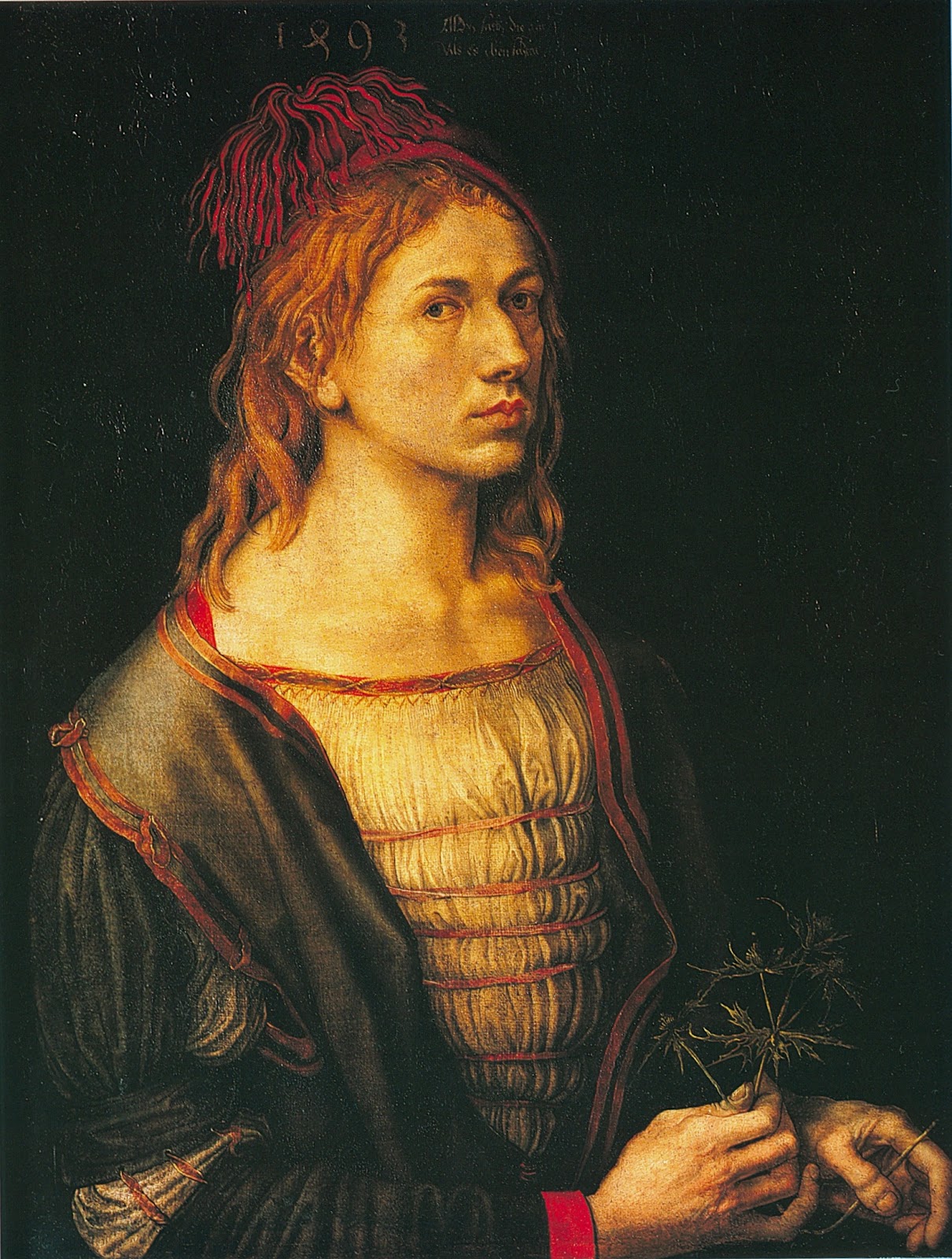
A portrait of Emperor Manuel during his younger years, c. 1489
Manuel I fitted the image of a prince in the minds of Elysians. An incredibly pious man, Manuel and the Church always loved working together to discuss matters on theology and all the church at large. On a popular level, commoners and merchants loved Manuel for marking Elysia with prosperity and for keeping the nobility in check. Manuel's staunch conservatism would also make him popular among traditionalists in the senate and had gained a noticeable oratory ability after many decades of speaking in the Senate.

Largely, through the history of the Empire, the center and beating heart of it all was the capital. Being the richest city in the entirety of the new world, the population of the city hadn’t grown much within the previous fifty years as many settlers emigrated outward to live in different regions of the Empire, building towns and cities in its wake. The capital itself, Neo Konstantinopolis, was the largest city in the Empire with only a modest population of just over 35,000 inhabitants, due to the city experiencing a smaller population due to a reputation of the capital being known as a ‘population sink. With the completion of the aquaducts, the hygiene of the region being improved tremendously, the demographic of the capital and nearby regions is set to explode in number.
The coming century was to bring about a time of great change for Elysia. With a strong nation under his rule, Emperor Manuel took the time to reflect on how far Elysia had come. If Manuel was to continue on the path of bringing prosperity and civilization to this strange new world, he needed to know the capabilities of the Empire.
From the cold stormy weather in the far north along the New Theodosian Bay to the lush Anthiros Peninsula, the realm of Elysia has grown tremendously. With a frontier to the East towards the great Mississippi River, all expansion efforts was to be focused along the region.
Since Foundation Day, the first few years of Elysian rule was characterised by the strength of will to rule. Emperor Constantine held the entire Empire together almost completely on his own until the government could be consolidated. For many years afterwards, as the strong Imperial government was shaped and molded, the position of Emperor had largely retained its importance. Elysia also inherited the ancient Roman traditions of the senate, which slowly grew overtime as new cities were founded within the Empire. Emperor Manuel, wishing to expand on Roman traditions which helped make the ancient republic and empire great, started to strengthen the senate and hopefully reorganise it to become more beneficial for the Empire.
Originally landing with nothing but the supplies they had brought with them, the new world of Elysium proved to provide much more than what was originally needed. Once the economy started to climb, Emperor Constantine and John both worked hard to strengthen it as much as possible and let it grow. With the rapid growth of the economy that’s likely not going to stop any time soon, Elysia was thriving.
Among trade, Elysian merchants worked hard to succeed in different markets, and largely dominated in them. All trade along the Bay of Elysia was completely controlled by the Empire, and had small influence in other markets. Due to the lack of any real trade within barbaroi regions, the organised Elysians became leaders.
The military, seen as the pride of Elysian expansionists, remained an incredibly powerful force on the continent. Originally weak and organised like a glorified militia, later reforms among the military would transform the Elysians from their militia roots to a stable army. Native armies, originally having the upper hand against the Elysians, were now largely powerless.
Elysification of provinces, both colonised and annexed, proved to be much more effective than the Senate had ever expected it to be. While the Elysian language was growing within popularity amongst the native populations, many spoken barbaroi languages were still spoken by converted natives. Smaller languages spoken amongst the Elysians were Norse, Ironquois and even Albanian. But the nature of the Elysian language and overwhelmingly Elysian population had kept local languages a minority, and given a generation or two, many of them would likely go extinct.
In the north, the Albanian populace of the Empire remained as culturally similar to their ancestors as much as possible. Where as the Greek language and culture began to fragment and become influenced by both local native languages and even Latin to some degree, the secluded Albanians made strict enforcement to keep their language. Due to their cold nature to not contribute to the Empire unless absolutely necessary, Emperor Manuel would need to plan ahead for integration of the Albanians into the realm, wherever they liked it or not.
In the north, Markland had vanquished Helluland in the Great Northern War and became sole Kingdom of the North. While knowledge of the Kingdom at large remained small, Markland had experienced a long period of isolation and internal focus for a many decades. It wasn’t until that, just recently, the Norse began a campaign of conquest against barbaroi nearby the Kingdom and slowly colonising one area at a time.
This wave of growing conquest was led by Jarl Leif V Erikson, who as a young boy, watched his grandfather meet with the newfound Elysians for the first time to discuss the trade agreement. While having a friendly demeanor as Jarl, Leif V was ruthless against his enemies and was known to have a fragile temper that, should the Jarl be angered, would send him into an uncontrollable rage. A devout follower of the Norse faith, many battles against the barbaroi would be personally led by him.
To the east was the lonesome island province of Creta Minor, led by the Megali Doukissa of Lanthanopolis, Anna I Notaras. Anna I was born under the shipwrecked survivors of the city, and under her reign, overseen its reintegration into Elysia as a semi-independent vassal state of the Empire. Known to be an adventurous woman, Anna I is also known to be a highly efficient administrator. A popular ruler, Anna I talked down the traitorous Aineas Romanos while in captivity.
In the far south, the dream of King Leonidas came to fruition, and civilization was brought to the powerful barbaroi. With the collapse of the powerful Triple Alliance, Elite Spartanian Warriors and native allies within its borders became the sole power in the area. Having only just consolidated their gains, Spartania faces trouble as civil unrest and guerrilla war by surviving Aztec warriors. Due to the mysterious nature of the far south, it is largely unknown to Elysians on the scale of the events that had happened there.
Leonidas Spartakon, originally born as Belisarius Palaiologos, quickly made a name for himself as a young man as a very capable military leader. As he led his personal exhibition to the lands of the south, he would become the first Vasillas of the newfound kingdom of Spartania. Undefeatable in battle, Leonidas and his elite armies overwhelmed the natives in the region and, after thirty years of conquest, took the entirety of what would become Laconia. With warfare done, the great warrior king was to spend the remainder of his reign on building the start of a great nation.
Within the Imperial Court itself, the Emperor was always surrounded by loyal men and women who served the Empire diligently. Coming from all aspects of government, from the military to finances, the Emperor could rely on the advisors who loved the Empire as much as he did. And for Manuel, he wanted to ensure that his son Theodosios had an Empire that he could inherit.
A portrait of Emperor Manuel during his younger years, c. 1489
Largely, through the history of the Empire, the center and beating heart of it all was the capital. Being the richest city in the entirety of the new world, the population of the city hadn’t grown much within the previous fifty years as many settlers emigrated outward to live in different regions of the Empire, building towns and cities in its wake. The capital itself, Neo Konstantinopolis, was the largest city in the Empire with only a modest population of just over 35,000 inhabitants, due to the city experiencing a smaller population due to a reputation of the capital being known as a ‘population sink. With the completion of the aquaducts, the hygiene of the region being improved tremendously, the demographic of the capital and nearby regions is set to explode in number.
Last edited:
Elysia's rise in just 60 years is astonishing indeed. Let's see how it rises in the next coming centuries.
Congratulations, I nominated you for WritAAR of the Week, I really enjoy your style and the story that you're creating here. Now it's your turn to enjoy the spotlight.
Congratulations, I nominated you for WritAAR of the Week, I really enjoy your style and the story that you're creating here. Now it's your turn to enjoy the spotlight.
Thank you for your consideration! Guess it's time to work harder on making better chapters
Chapter 11: Imperium (1500-1507)
Chapter 11: Imperium (1500-1507)
Brought about with a desire for change to the western territories, Emperor Manuel started to prepare Elysia for the next phase of its destiny. With the political climate calm across the Empire, expansion became the next major focus among the senate. With the Emperor’s desires on focusing along the coastline and the south, it was easier for administration to govern and integrate the outlying territories instead of the north. With tribes being weaker in the region and with Elysian expansion having taken place in the south for several decades now, it was a natural decision to expand within the region. And with the success and beauty of the Anthiros Peninsular being displayed for settlers there, it fascinated explorers to venture west.

On a domestic scale, Elysia dwarfed many of the outlying tribes and was the largest state on the continent. With strong diplomatic relations and vassal states serving Elysia and its political interests, Elysia was shining where nowhere else on the continent was. Growing on a rapid unprecedented scale, Elysia had accomplished more in just 55 years then what Rome accomplished in two centuries before the rise of Caesar.
But as Elysia grew stronger, the recently united Spartania had its own ambitions and no longer wanted to live in the shadow of the Empire. Although grateful for the Empire’s assistance, Leonidas started to distance himself and his people completely from Elysia. In a display of arrogance, Leonidas’s attempts to create a national identity for Spartania would forever harm the relationship between the Spartans and the Elysians.


Leonidas would get to work immediately severing every single diplomatic tie that Spartania had with the Elysians. Messengers would be sent from the southern lands to Nea Konstantinopolis to inform the King that Spartania had officially ended all the alliance between the two nations, seeing as the alliance simply wasn’t necessary. To further add to an insult the Empire, the messengers had declared Spartania that, in time, the Spartans would become a greater nation than anything the Elysians could ever be. The Senate’s reaction to the Spartan declaration was one of shock, as relations with the south had only been incredibly high just the year before. Several prominent warhawks within the administration, seeing this as an grave insult to the Empire, wanted war against the arrogant southerners. The Emperor, while incredibly frustrated at Leonidas’s sudden hostility, called his bluff and led the Empire to avoid war against the south. With war avoided, efforts could be concentrated onto settling the south.
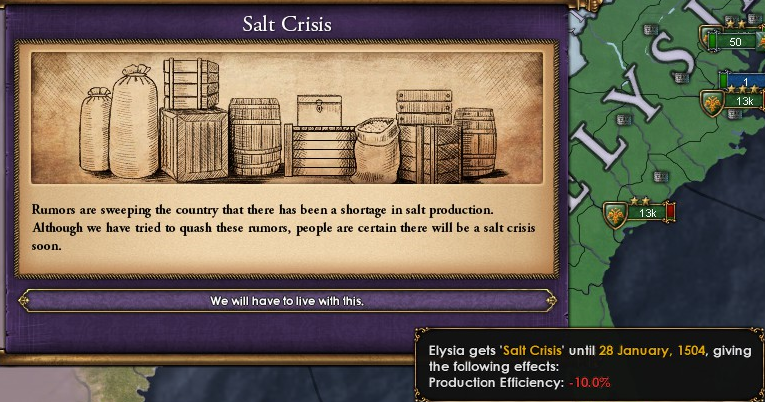
Just as settlement began, rumors suddenly swept the nation that there had been a shortage in salt production. Despite the Senate and the administration doing its best to quash such rumors, the commoners feared that that there will be a salt crisis soon. Productivity was slowed down with salt production, and the price of salt suddenly spiked within the markets. Nothing could have been done to prevent this, and for the time-being, the Empire had to endure.

While Emperor Manuel and Elysia focused upon the south, Leonidas had focused on matters of theology. In the south, the priests and bishops of Spartania had struggled against the conquered barbaroi who had continued to worship their bloodthirsty gods. The newly appointed Patriarch of Spartania had recently called a great council in Lakedaimon to better combat the barbaroi idolatry. For days, priests and bishops had debated for days, studying doctrine and theology in their quest to better strengthen the Christian faith in the area in the war against heresy. After days of debate, they had agreed that the church should appeal to the similarities between the Saints and their heathen idols, taking a more cautious approach rather than violently destroying the violent heathen faith at every given opputunity.
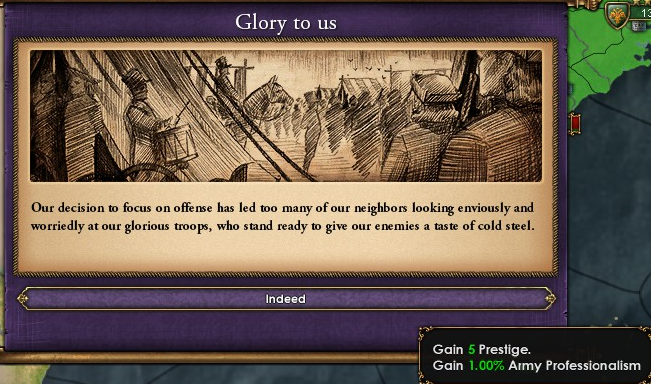
With the decision to focus on the offensive, many of the Empire’s neighbors and subjects look enviously and worriedly at the sight of the grand imperial army, who stand ready to give the enemies of the empire a taste of furious steel. Amongst the natives, the sheer ability of the Elysians in battle completely terrified smaller tribes.
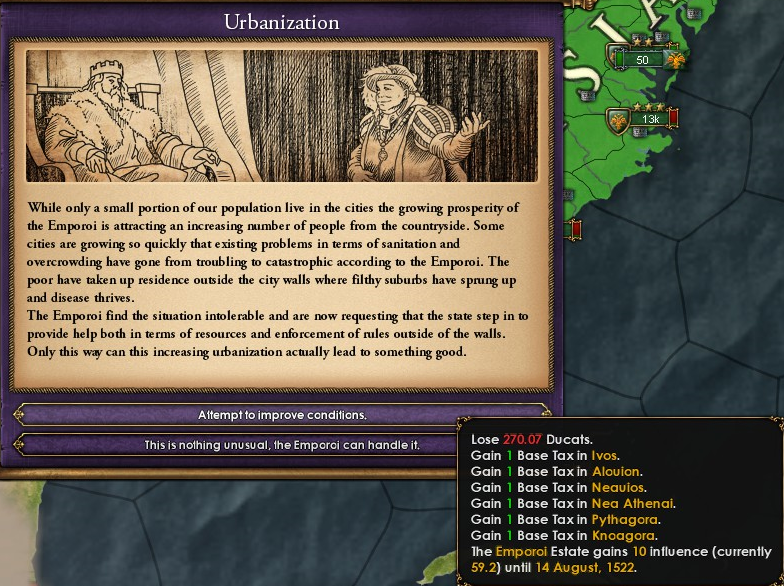
While the new lands of Elysium allowed rapid population growth at a tremendous pace, a small portion of the population only lived in the cities. The capital itself only had just a humble population of just over 35,000. However, the Emporoi’s success in the wealthy cities had been attracting an increasing number of the countryside and cities are growing so quickly that existing problems in terms of sanitation and overcrowding had gone from troubling to catastrophic. The poor had taken up residence outside of city walls where in slums, where disease thrives and crime runs rampant.
The Emporoi themselves had find the situation intolerable and are now requesting that the Empire officially step in to provide help in terms of assistance in terms of resources and enforcement of rule and law outside of the walls to improve conditions. Immediately, the Empire immediately attempted to improve conditions.

Her majesty, Anastasia Kamateros, is a constant companion and a good advisor for her husband in her own right. The Empress, outside of that role, is also a representative of the crown to the noble house of Kamateros. Happily married to her husband, Anastasia seemed very pleased to announce that her family had decided to show its support for the throne and for the blissful union of Manuel and Anastasia.
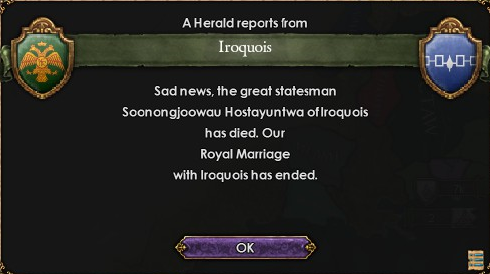
On Feburary 5th 1503, the great chief Soonongjoowau Hostayuntwa of the Iroquois had died at the age of 54. Known as a great chief to the confederacy, he was instrumental for the success of Christianity in the region and for becoming a loyal vassal of the Elysians in exchange for protection. Loved by both converted natives and Elysians alike, the Iroquois would enter a period of mourning. A friend of his older brother, Emperor Manuel personally paid for funeral expenses for the great chief.
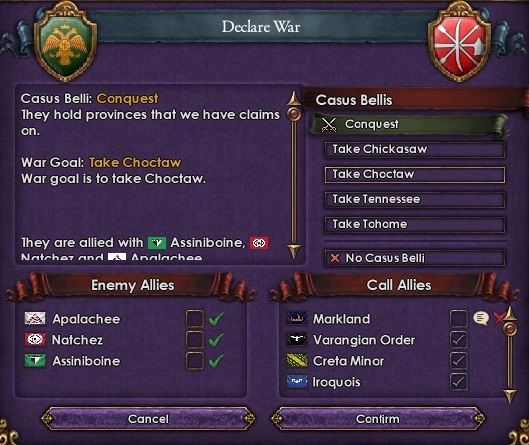
With preparations for the south completed by late 1503, the largest of the barbaroi of the region, the Choctaw, had built up an alliance chain that comprised of their neighbours. Seeing this as a means to eliminate all opposition among the south, Elysia mobilised and ascembed an intimidating number of soldiers in the area. Outnumbering the natives almost three to one, and completely outclassing them in practical combat efficiency, Elysia declared war. And in the coming days, the natives would have no idea what would hit them.

Logistically, the commanders of individual themes immediately worked together to launch coordinated attacks against the barbaroi armies. The harsh terrain of the south, with its swamps and vast woodlands, slowed down the progress of military advancement considerably. Along the terrain, the Thema’s had to cross the vast mississippi river which slowed down advancements. The inhospitable terrain made the campaign difficult, and for the Empire, attrition and disease was a larger problem than combat with the natives. Explorers within the region had trouble within the area prior to the war, but fortunately, the downsides of traveling in the region seen a change of fortunes.

Early in the war, the overwhelming strength of an Elysian offensive completely overwhelmed the Natchez in Tennessee. While the Elysians had numerical superiority, the offensive abilities of its hardened soldiers devastated the barabori. Tiverios Phouskarnaki, using the double-envelopment tactic, surrounded and annihilated the Natchez. Enclosed in a pocket, the Elysians created an unbreakable wall around the Natchez and began destroying them. As the barbaroi were cut down, they began taking horrendous casualties and panic rapidly set along their ranks as they tried to break formation and flee. Some openly committed suicide while standing right next to their own soldiers, and the Natchez were in complete disarray.
In only six hours, the Natchez were killed where they stood, and all 6,000 of them were killed to the last man. The Natchez commander would later be executed by the Elysians after the battle, and the Elysians won the battle at the cost of a small amount of their forces. The devastation of the Natchez was so severe that Tiverious deliberately refused a burial for the dead barbaroi, using their corpses as a grim reminder for all barbaroi who fight against Elysia.

During the astounding success of the Choctaw War, Emperor Manuel made an impassioned speech to the senate. Cultural fragmentation, while having occurred for decades, had become much more noticeable as the Elysians spread far and wide. The capital and the surrounding Elysian bay had stayed as close as possible to the old traditional hellenic ways as possible, largely due to formal usage at court and among the nobility in the area, to which the dialect was known as High Elysian. Among the coastal provinces, there was the Elyshi who spoke a rougher pronunciation of the language that became popular among sailors due to the difficulty of speaking along the decks due to the loud winds and waves. Inland, the Elyric had become the closest among the natives and had the largest adoption of their languages, and natives who had integrated into the Empire had. Alongside the senate, Emperor Manuel popularly reformed the senate and began reforms upon the government of the Empire.
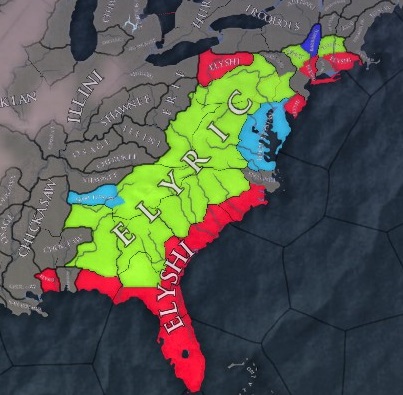
Despite the various accents and changes in language, the Elysians still spoke a common tongue that was influenced in both former Greek and Native languages and even had cosmopolitan traces in the language left over from the Old World as well as the new one. As the Empire continued to grow, so would its language and culture.
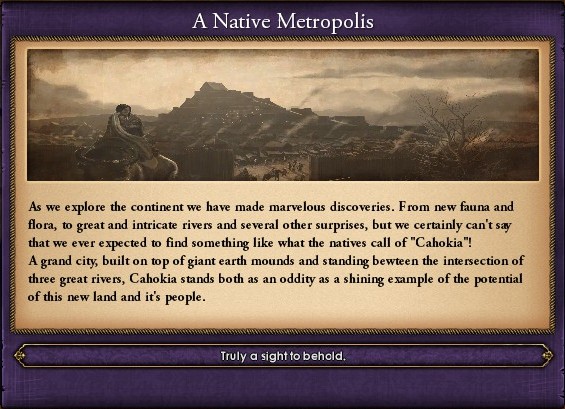
By 1504, Elysian explorers had made a breathtaking discovery. From fauna and flora to intricate rivers and other surprises, the Elysians were fascinated at every turn at the beauty and wealth that Elysium had provided its people with. But expectations were blown out of the water with the discovery of a grand city the natives called “Cahokia”. Built on the top of giant earth mounds and standing between the intersection of three great rivers, Cahokia amazed Elysians due to its unique oddity as a shining example of the potential of this new land and its people.
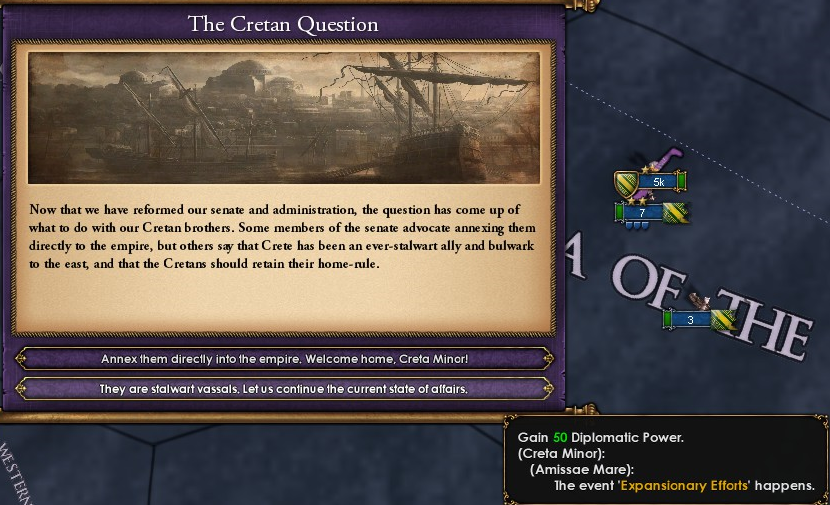
In Creta Minor, with the reformation of the senate and administration, Emperor Manuel allowed the Creatan’s to retain their home-rule as an ever-stalwart ally and bulwark to the East. Continuing the current state of affairs, Emperor Manuel would task Creta Minor wish an exceptionally special task. For their loyalty to the Empire, Creta Minor would be given the task to explore and settle the Kykladian Archipelago for the Empire, allowing the Elysians to focus on the mainland. The Senate and the Empire will help with supplying the Cretans with whatever they need, and the Cretans would be given more of a say among the Empire. Immediately, the Cretans leapt at the offer and offered their gratitude for Elysia.
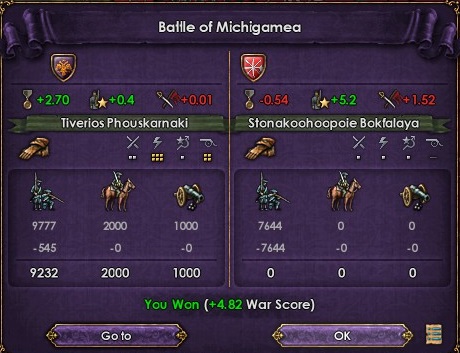
In the battle of Michigamea, the Choctaw were eliminated by the Elysians are a great upset, once again led by Tiverios Phouskarnaki. With the defeat of the Choctaw and the lands of their allies occupied, negotiations would be harsh.
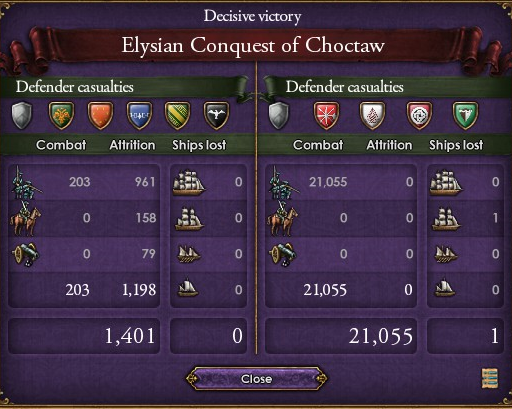
A year after the start of the war, the Elysians made a decisive victory in the south against the Choctaw and their allies. The Choctaw, Appalanshee and Natchez would all be annexed into the Empire and experience swift integration. On a territorial aspect, the war was a complete success. The territory of the Empire, combined with existing settlements and colonies already being built in the south, had largely achieved the ambition that Emperor Manuel desired. Rather than a long costly campaign that senators projected to take ten to twenty years, the Elysians had taken well over 70% of the desired territories in just over a year. Emperor Manuel’s popularity soared to new heights, and the Elysian Emperor gave thanks to God and the brave men for the Empire for their contribution into making the Empire strong.
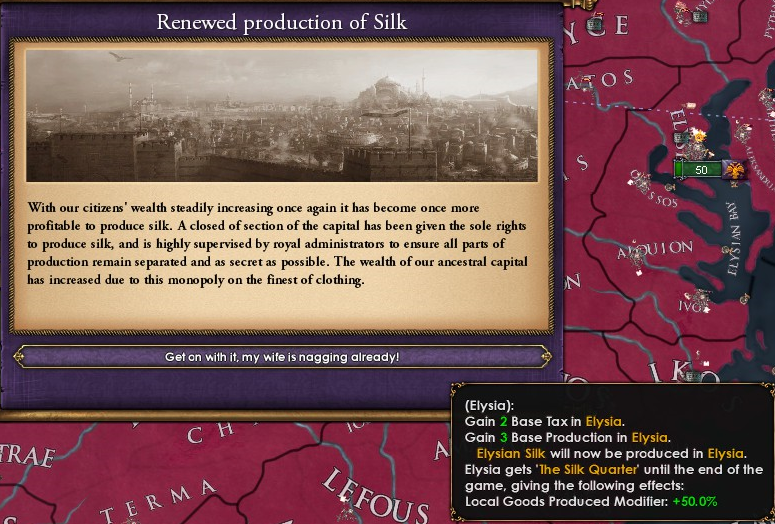
With the average citizen’s wealth increasing, alongside a blossoming economy, it became profitable once again to produce silk. One of the treasures brought by the Eastern Romans during the odyssey, a closed section of the capital has been given the sole rights to produce silk. Highly supervised by royal administrators to ensure that all parts of production remain as separated and secret as possible, the wealth of the capital continued to soar due to the monopoly that Nea Konstantinopolis held on clothing and silk. This new ‘Elysian Silk’ allowed the already extremely wealthy capital to thrive even more, and even reach greater heights than Old Konstantinopolis had ever reached. All that was stopping the Elysians from becoming even greater then their ancestors was the population, which while growing at tremendous speeds, was still miniscule in comparison to that of the Old World.

The Elysian Empire, as of 1505, had seen such rapid growth in every shape and form. In was the perfect example of wealth, might and glory among the new world. And yet, the Empire still had a very long way to go yet. Emperor Manuel watched ships pass by as he overlooked the great river, looking out the palace windows. He remembered the story that his father told him as a young boy, about the visions from god from an uncle he never knew and how they were originally interpreted as dreams. The visions that his father’s brother had received allowed the Odyssey to happen.
As a young boy, his father Constantine had deliberately left out the last half of the visions that were seen. But as the young Manuel grew into the man he was today, he finally began to understand what was exactly left out. It was the ambitions of the future.
Manuel soon turned around and began to walk out of the room he was in, pondering in deep thought about the stories he was told when he was younger. He had heard stories of the old homeland, and how they came from a world unlike that of Elysium, a world that was known as ‘Europe’. In time, the Emperor thought, it would be time to rediscover what the ancestral homelands of the Romans and Greeks were like.

After the agreement for becoming a vassal of the Empire during the reign of Emperor John, the terms for the Iroquois was the reinforcement of their military and that for a period of ten to fifteen years, the Iroquois would not be required to pay taxes to the Empire. Under the rule of Manuel, the Emperor declared the status of March be revoked among the Iroquois as per agreement and return to the status of vassal once again. While this was to harm the relationship between the two states, it would begin to return again overtime.
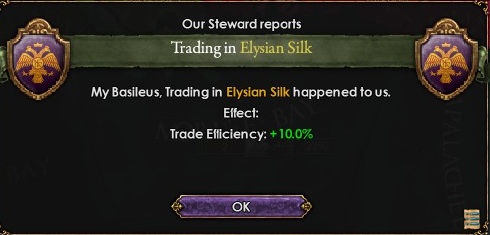
With the silk industry having been resurrected, the Elysian Silk that was being produced in the capital was already within high demand as the first clothing made with the material was being released. Due to its high demand, the economy seen a noticeable boost.
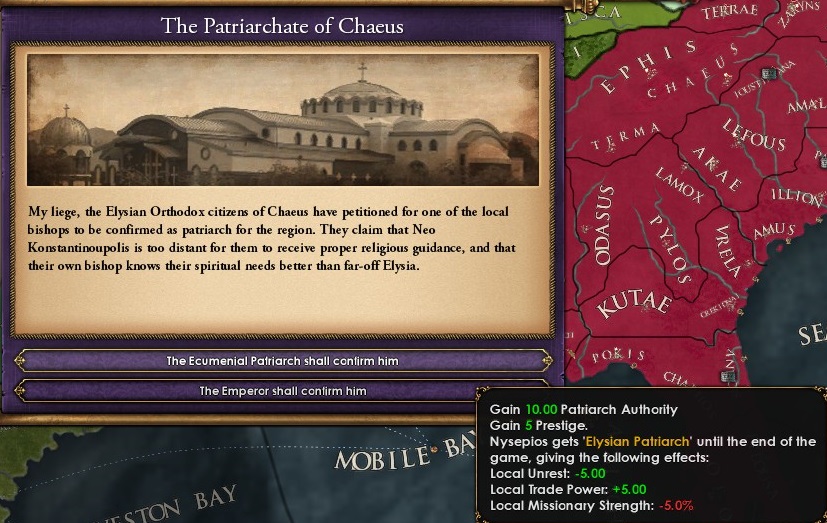
In the south, the Elysian Orthodox citizens have petitioned for a local bishop to become promoted as Patriarch for the region. Wanting to strengthen the newly conquered territory under Elysian influence, the Ecumential Patriarch confirmed the bishop.
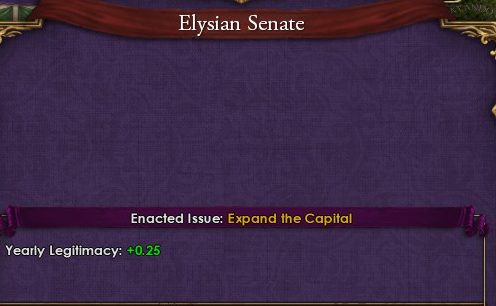
With the new senate, Nea Konstantinopolis still remained the small wealthy capital that it had always been. After decades of growth, the first act of the Emperor and the reorganised Elysian Senate was the expansion of the Capital. With new funding, the capital received a concentrated focus on improving the city and making it as grand as the great cities of old. With hygiene becoming less and less of an issue and the population in the city on the rise, the opulence of the capital was to be put onto display. Like Rome, the city was to be transformed from a small city and into a sprawling metropolis of a grand Empire. Building projects started to be funded left and right, and the capital started to truly look modern and grand.
So much was the wealth currently in the city and the wealth being invested into it that, among the Emporoi, the capital was referred to as the ‘City of Dreams’. If a simple merchant can make it in the capital, it can make it anywhere in the world.
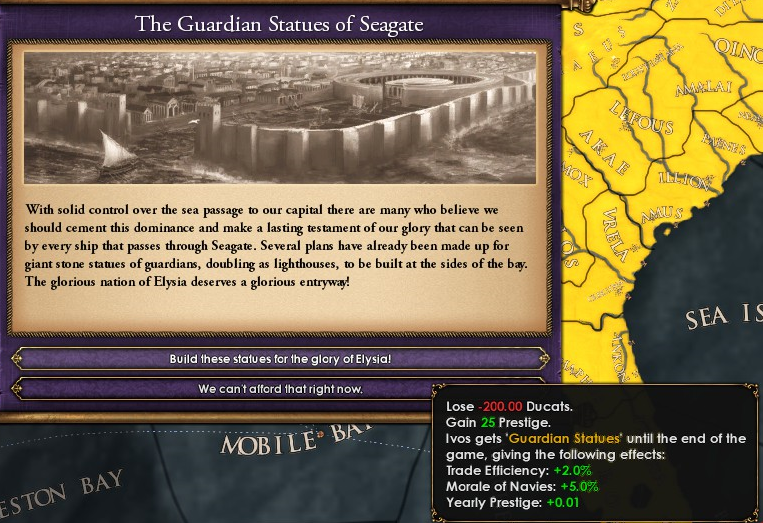
With solid control over the Elysian bay, there are many within the senate and the estates of the Empire who believe that the Empire should cement this dominance and make a lasting testament of glory of every ship that passes through Seagate. On 1506, funding had been approved to for the construction of giant stone statues of guardians, doubling as lighthouses, to be build at both sides of the Elysian Bay.
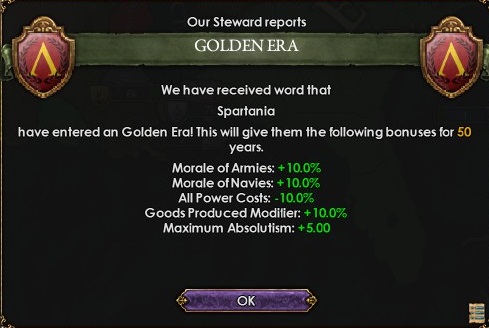
In Spartania, having secured the region from all possible threats, King Leonidas declared the coming era of his realm to enter the Golden Era of Spartania. Although the Spartans had worked hard to secure their new realm, it started to become apparent of the aging King Leonidas, and many feared of what life could be without their living legend of a ruler.

To compensate for the large spending on large-scale projects, treasurers argued that the senate needed to enact some reform in retain the economy’s strength. With a new master of mint needing to be hired to take care of the economy, the reforms were enacted, much to the displeasure of those who were relying on the progress of the economy.
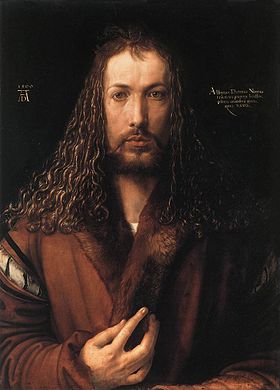
Emperor Manuel I Palaiologos of Elysia, c. 1507
Within another boom period of the economy and for plans to strengthen the nation, the Emperor was widely seen as bringing wealth to the commoners. Although his social policies were largely traditionalist, especially in matters on religion, there was none in Elysia who could claim that the Emperor wasn’t caring about the nation as a whole. Primarily responsible for a new wave of exploration and colonisation, the Emperor and the Senate worked hard. Although age was now starting to catch up to Manuel, the older Emperor brought about change on a more practical scale unlike the Emperors before him.
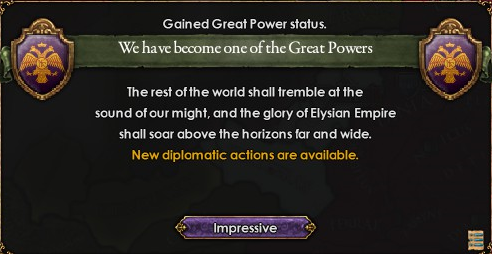
And it showed. The Empire’s growth had now started to overwhelm even the greatest of antiquity. With humble origins similar to Rome, the Empire grew from a single capital to the gigantic Empire it became in a short period of time. The coming years was to be a period of growth as a mighty Imperium, capable of mastering this new world and had the potential to rule beyond that. Emperor Constantine famously spoke that on the day that Elysia could walk on its own, it would be the day that he would die. Emperor John, his successor, was able to guide the Empire to walk onto it’s own two feet without stumbling, and after practise, it was carefully able to walk upright.
Now….it was time for Elysia to run.
Brought about with a desire for change to the western territories, Emperor Manuel started to prepare Elysia for the next phase of its destiny. With the political climate calm across the Empire, expansion became the next major focus among the senate. With the Emperor’s desires on focusing along the coastline and the south, it was easier for administration to govern and integrate the outlying territories instead of the north. With tribes being weaker in the region and with Elysian expansion having taken place in the south for several decades now, it was a natural decision to expand within the region. And with the success and beauty of the Anthiros Peninsular being displayed for settlers there, it fascinated explorers to venture west.
On a domestic scale, Elysia dwarfed many of the outlying tribes and was the largest state on the continent. With strong diplomatic relations and vassal states serving Elysia and its political interests, Elysia was shining where nowhere else on the continent was. Growing on a rapid unprecedented scale, Elysia had accomplished more in just 55 years then what Rome accomplished in two centuries before the rise of Caesar.
But as Elysia grew stronger, the recently united Spartania had its own ambitions and no longer wanted to live in the shadow of the Empire. Although grateful for the Empire’s assistance, Leonidas started to distance himself and his people completely from Elysia. In a display of arrogance, Leonidas’s attempts to create a national identity for Spartania would forever harm the relationship between the Spartans and the Elysians.
Leonidas would get to work immediately severing every single diplomatic tie that Spartania had with the Elysians. Messengers would be sent from the southern lands to Nea Konstantinopolis to inform the King that Spartania had officially ended all the alliance between the two nations, seeing as the alliance simply wasn’t necessary. To further add to an insult the Empire, the messengers had declared Spartania that, in time, the Spartans would become a greater nation than anything the Elysians could ever be. The Senate’s reaction to the Spartan declaration was one of shock, as relations with the south had only been incredibly high just the year before. Several prominent warhawks within the administration, seeing this as an grave insult to the Empire, wanted war against the arrogant southerners. The Emperor, while incredibly frustrated at Leonidas’s sudden hostility, called his bluff and led the Empire to avoid war against the south. With war avoided, efforts could be concentrated onto settling the south.
Just as settlement began, rumors suddenly swept the nation that there had been a shortage in salt production. Despite the Senate and the administration doing its best to quash such rumors, the commoners feared that that there will be a salt crisis soon. Productivity was slowed down with salt production, and the price of salt suddenly spiked within the markets. Nothing could have been done to prevent this, and for the time-being, the Empire had to endure.
While Emperor Manuel and Elysia focused upon the south, Leonidas had focused on matters of theology. In the south, the priests and bishops of Spartania had struggled against the conquered barbaroi who had continued to worship their bloodthirsty gods. The newly appointed Patriarch of Spartania had recently called a great council in Lakedaimon to better combat the barbaroi idolatry. For days, priests and bishops had debated for days, studying doctrine and theology in their quest to better strengthen the Christian faith in the area in the war against heresy. After days of debate, they had agreed that the church should appeal to the similarities between the Saints and their heathen idols, taking a more cautious approach rather than violently destroying the violent heathen faith at every given opputunity.
With the decision to focus on the offensive, many of the Empire’s neighbors and subjects look enviously and worriedly at the sight of the grand imperial army, who stand ready to give the enemies of the empire a taste of furious steel. Amongst the natives, the sheer ability of the Elysians in battle completely terrified smaller tribes.
While the new lands of Elysium allowed rapid population growth at a tremendous pace, a small portion of the population only lived in the cities. The capital itself only had just a humble population of just over 35,000. However, the Emporoi’s success in the wealthy cities had been attracting an increasing number of the countryside and cities are growing so quickly that existing problems in terms of sanitation and overcrowding had gone from troubling to catastrophic. The poor had taken up residence outside of city walls where in slums, where disease thrives and crime runs rampant.
The Emporoi themselves had find the situation intolerable and are now requesting that the Empire officially step in to provide help in terms of assistance in terms of resources and enforcement of rule and law outside of the walls to improve conditions. Immediately, the Empire immediately attempted to improve conditions.
Her majesty, Anastasia Kamateros, is a constant companion and a good advisor for her husband in her own right. The Empress, outside of that role, is also a representative of the crown to the noble house of Kamateros. Happily married to her husband, Anastasia seemed very pleased to announce that her family had decided to show its support for the throne and for the blissful union of Manuel and Anastasia.
On Feburary 5th 1503, the great chief Soonongjoowau Hostayuntwa of the Iroquois had died at the age of 54. Known as a great chief to the confederacy, he was instrumental for the success of Christianity in the region and for becoming a loyal vassal of the Elysians in exchange for protection. Loved by both converted natives and Elysians alike, the Iroquois would enter a period of mourning. A friend of his older brother, Emperor Manuel personally paid for funeral expenses for the great chief.
With preparations for the south completed by late 1503, the largest of the barbaroi of the region, the Choctaw, had built up an alliance chain that comprised of their neighbours. Seeing this as a means to eliminate all opposition among the south, Elysia mobilised and ascembed an intimidating number of soldiers in the area. Outnumbering the natives almost three to one, and completely outclassing them in practical combat efficiency, Elysia declared war. And in the coming days, the natives would have no idea what would hit them.
Logistically, the commanders of individual themes immediately worked together to launch coordinated attacks against the barbaroi armies. The harsh terrain of the south, with its swamps and vast woodlands, slowed down the progress of military advancement considerably. Along the terrain, the Thema’s had to cross the vast mississippi river which slowed down advancements. The inhospitable terrain made the campaign difficult, and for the Empire, attrition and disease was a larger problem than combat with the natives. Explorers within the region had trouble within the area prior to the war, but fortunately, the downsides of traveling in the region seen a change of fortunes.
Early in the war, the overwhelming strength of an Elysian offensive completely overwhelmed the Natchez in Tennessee. While the Elysians had numerical superiority, the offensive abilities of its hardened soldiers devastated the barabori. Tiverios Phouskarnaki, using the double-envelopment tactic, surrounded and annihilated the Natchez. Enclosed in a pocket, the Elysians created an unbreakable wall around the Natchez and began destroying them. As the barbaroi were cut down, they began taking horrendous casualties and panic rapidly set along their ranks as they tried to break formation and flee. Some openly committed suicide while standing right next to their own soldiers, and the Natchez were in complete disarray.
In only six hours, the Natchez were killed where they stood, and all 6,000 of them were killed to the last man. The Natchez commander would later be executed by the Elysians after the battle, and the Elysians won the battle at the cost of a small amount of their forces. The devastation of the Natchez was so severe that Tiverious deliberately refused a burial for the dead barbaroi, using their corpses as a grim reminder for all barbaroi who fight against Elysia.
During the astounding success of the Choctaw War, Emperor Manuel made an impassioned speech to the senate. Cultural fragmentation, while having occurred for decades, had become much more noticeable as the Elysians spread far and wide. The capital and the surrounding Elysian bay had stayed as close as possible to the old traditional hellenic ways as possible, largely due to formal usage at court and among the nobility in the area, to which the dialect was known as High Elysian. Among the coastal provinces, there was the Elyshi who spoke a rougher pronunciation of the language that became popular among sailors due to the difficulty of speaking along the decks due to the loud winds and waves. Inland, the Elyric had become the closest among the natives and had the largest adoption of their languages, and natives who had integrated into the Empire had. Alongside the senate, Emperor Manuel popularly reformed the senate and began reforms upon the government of the Empire.
Despite the various accents and changes in language, the Elysians still spoke a common tongue that was influenced in both former Greek and Native languages and even had cosmopolitan traces in the language left over from the Old World as well as the new one. As the Empire continued to grow, so would its language and culture.
By 1504, Elysian explorers had made a breathtaking discovery. From fauna and flora to intricate rivers and other surprises, the Elysians were fascinated at every turn at the beauty and wealth that Elysium had provided its people with. But expectations were blown out of the water with the discovery of a grand city the natives called “Cahokia”. Built on the top of giant earth mounds and standing between the intersection of three great rivers, Cahokia amazed Elysians due to its unique oddity as a shining example of the potential of this new land and its people.
In Creta Minor, with the reformation of the senate and administration, Emperor Manuel allowed the Creatan’s to retain their home-rule as an ever-stalwart ally and bulwark to the East. Continuing the current state of affairs, Emperor Manuel would task Creta Minor wish an exceptionally special task. For their loyalty to the Empire, Creta Minor would be given the task to explore and settle the Kykladian Archipelago for the Empire, allowing the Elysians to focus on the mainland. The Senate and the Empire will help with supplying the Cretans with whatever they need, and the Cretans would be given more of a say among the Empire. Immediately, the Cretans leapt at the offer and offered their gratitude for Elysia.
In the battle of Michigamea, the Choctaw were eliminated by the Elysians are a great upset, once again led by Tiverios Phouskarnaki. With the defeat of the Choctaw and the lands of their allies occupied, negotiations would be harsh.
A year after the start of the war, the Elysians made a decisive victory in the south against the Choctaw and their allies. The Choctaw, Appalanshee and Natchez would all be annexed into the Empire and experience swift integration. On a territorial aspect, the war was a complete success. The territory of the Empire, combined with existing settlements and colonies already being built in the south, had largely achieved the ambition that Emperor Manuel desired. Rather than a long costly campaign that senators projected to take ten to twenty years, the Elysians had taken well over 70% of the desired territories in just over a year. Emperor Manuel’s popularity soared to new heights, and the Elysian Emperor gave thanks to God and the brave men for the Empire for their contribution into making the Empire strong.
With the average citizen’s wealth increasing, alongside a blossoming economy, it became profitable once again to produce silk. One of the treasures brought by the Eastern Romans during the odyssey, a closed section of the capital has been given the sole rights to produce silk. Highly supervised by royal administrators to ensure that all parts of production remain as separated and secret as possible, the wealth of the capital continued to soar due to the monopoly that Nea Konstantinopolis held on clothing and silk. This new ‘Elysian Silk’ allowed the already extremely wealthy capital to thrive even more, and even reach greater heights than Old Konstantinopolis had ever reached. All that was stopping the Elysians from becoming even greater then their ancestors was the population, which while growing at tremendous speeds, was still miniscule in comparison to that of the Old World.
The Elysian Empire, as of 1505, had seen such rapid growth in every shape and form. In was the perfect example of wealth, might and glory among the new world. And yet, the Empire still had a very long way to go yet. Emperor Manuel watched ships pass by as he overlooked the great river, looking out the palace windows. He remembered the story that his father told him as a young boy, about the visions from god from an uncle he never knew and how they were originally interpreted as dreams. The visions that his father’s brother had received allowed the Odyssey to happen.
As a young boy, his father Constantine had deliberately left out the last half of the visions that were seen. But as the young Manuel grew into the man he was today, he finally began to understand what was exactly left out. It was the ambitions of the future.
Manuel soon turned around and began to walk out of the room he was in, pondering in deep thought about the stories he was told when he was younger. He had heard stories of the old homeland, and how they came from a world unlike that of Elysium, a world that was known as ‘Europe’. In time, the Emperor thought, it would be time to rediscover what the ancestral homelands of the Romans and Greeks were like.
After the agreement for becoming a vassal of the Empire during the reign of Emperor John, the terms for the Iroquois was the reinforcement of their military and that for a period of ten to fifteen years, the Iroquois would not be required to pay taxes to the Empire. Under the rule of Manuel, the Emperor declared the status of March be revoked among the Iroquois as per agreement and return to the status of vassal once again. While this was to harm the relationship between the two states, it would begin to return again overtime.
With the silk industry having been resurrected, the Elysian Silk that was being produced in the capital was already within high demand as the first clothing made with the material was being released. Due to its high demand, the economy seen a noticeable boost.
In the south, the Elysian Orthodox citizens have petitioned for a local bishop to become promoted as Patriarch for the region. Wanting to strengthen the newly conquered territory under Elysian influence, the Ecumential Patriarch confirmed the bishop.
With the new senate, Nea Konstantinopolis still remained the small wealthy capital that it had always been. After decades of growth, the first act of the Emperor and the reorganised Elysian Senate was the expansion of the Capital. With new funding, the capital received a concentrated focus on improving the city and making it as grand as the great cities of old. With hygiene becoming less and less of an issue and the population in the city on the rise, the opulence of the capital was to be put onto display. Like Rome, the city was to be transformed from a small city and into a sprawling metropolis of a grand Empire. Building projects started to be funded left and right, and the capital started to truly look modern and grand.
So much was the wealth currently in the city and the wealth being invested into it that, among the Emporoi, the capital was referred to as the ‘City of Dreams’. If a simple merchant can make it in the capital, it can make it anywhere in the world.
With solid control over the Elysian bay, there are many within the senate and the estates of the Empire who believe that the Empire should cement this dominance and make a lasting testament of glory of every ship that passes through Seagate. On 1506, funding had been approved to for the construction of giant stone statues of guardians, doubling as lighthouses, to be build at both sides of the Elysian Bay.
In Spartania, having secured the region from all possible threats, King Leonidas declared the coming era of his realm to enter the Golden Era of Spartania. Although the Spartans had worked hard to secure their new realm, it started to become apparent of the aging King Leonidas, and many feared of what life could be without their living legend of a ruler.
To compensate for the large spending on large-scale projects, treasurers argued that the senate needed to enact some reform in retain the economy’s strength. With a new master of mint needing to be hired to take care of the economy, the reforms were enacted, much to the displeasure of those who were relying on the progress of the economy.

Emperor Manuel I Palaiologos of Elysia, c. 1507
Within another boom period of the economy and for plans to strengthen the nation, the Emperor was widely seen as bringing wealth to the commoners. Although his social policies were largely traditionalist, especially in matters on religion, there was none in Elysia who could claim that the Emperor wasn’t caring about the nation as a whole. Primarily responsible for a new wave of exploration and colonisation, the Emperor and the Senate worked hard. Although age was now starting to catch up to Manuel, the older Emperor brought about change on a more practical scale unlike the Emperors before him.
And it showed. The Empire’s growth had now started to overwhelm even the greatest of antiquity. With humble origins similar to Rome, the Empire grew from a single capital to the gigantic Empire it became in a short period of time. The coming years was to be a period of growth as a mighty Imperium, capable of mastering this new world and had the potential to rule beyond that. Emperor Constantine famously spoke that on the day that Elysia could walk on its own, it would be the day that he would die. Emperor John, his successor, was able to guide the Empire to walk onto it’s own two feet without stumbling, and after practise, it was carefully able to walk upright.
Now….it was time for Elysia to run.
Nice update.
Do you rename provinces manually? And if so, where do you find all those names?
Playing as Elysia with all those native named provinces lying around always felt odd.
Do you rename provinces manually? And if so, where do you find all those names?
Playing as Elysia with all those native named provinces lying around always felt odd.
When was the last time you played? I'm pretty sure most eastern provinces rename like that automatically. In the next update it SHOULD be most of NA that gets renamed provinces for Elysians.Nice update.
Do you rename provinces manually? And if so, where do you find all those names?
Playing as Elysia with all those native named provinces lying around always felt odd.
Strange, I'm doing a playthrough just these days and the provinces don't switch names automatically.When was the last time you played? I'm pretty sure most eastern provinces rename like that automatically. In the next update it SHOULD be most of NA that gets renamed provinces for Elysians.
Are the high elysian provinces all switching (i.e. Ivos)? If not then you may have accidentally turned off dynamic province names. If you havent disabled this then maybe next update will have more name switches than I thought...Strange, I'm doing a playthrough just these days and the provinces don't switch names automatically.
Threadmarks
View all 100 threadmarks
Reader mode
Reader mode

